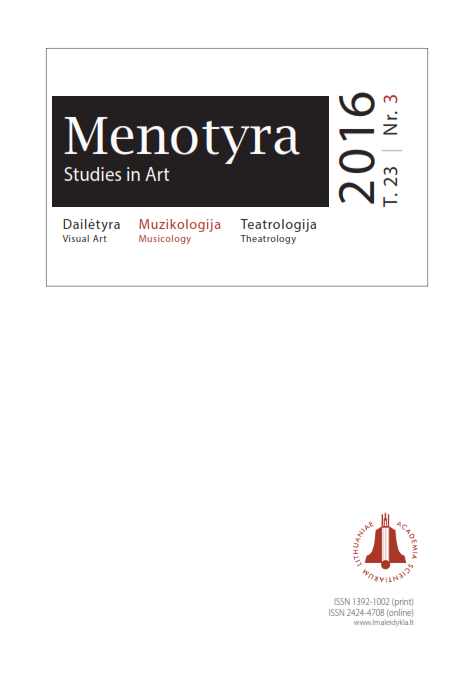Tarpukario Lietuvos operos kultūra Pierre’o Bourdieu socialinio lauko teorijos kontekste: aptariant Jurgio Karnavičiaus „Gražinos“ premjerą
Pierre Bourdieu’s Concept of the Field through the investigation of operatic culture of interwar Lithuania: on the premiere of “Gražina” by Jurgis Karnavičius
Author(s): Beata BaublinskienėSubject(s): Theatre, Dance, Performing Arts, Fine Arts / Performing Arts, Music, Sociology of the arts, business, education, Interwar Period (1920 - 1939)
Published by: Lietuvos mokslų akademijos leidykla
Keywords: opera; Jurgis Karnavičius’ “Gražina”; Vladas Jakubėnas; music critique; social field; Pierre Bourdieu
Summary/Abstract: The operatic culture is inseparable from its social environment, and as such it implicates not only a musicological, but also sociological and anthropological approach.The operatic culture of interwar Lithuania (192038–1940) was a rather controversial phenomenon. In the middle of it stood the State Theatre of Kaunas (then, the capital of Lithuania) that was richly subsidized by the state. However, the critique – reviews in national dailies – particularly those dealing with the subject of national operas, indicated a certain tension or a conflict of interest concerning legitimation in the opera field between its agents.The case of the premiere of Jurgis Karnavičius’ opera “Gražina” (1933) – the first new Lithuanian opera staged in the independent Lithuania – is representative in this regard. A critic of a semiofficial newspaper of the day “Lietuvos aidas” (“Lithuanian Echo”), Vladas Jakubėnas, wrote in his review: “Our society’s desire to have a national opera was not totally fulfilled this time. As we know from the history of opera, such works get created only by those who descend from the core of the nation. <...> The spirit of Mr. Karnavičius’ music isn’t truly close to our folk tunes”.As we can see in this evaluation of the work, the criteria of the evaluation of the work – society’s desire to have a national opera that must be fulfilled and expectation that the spirit of the music must be truly Lithuanian – are not connected sensu stricto with the art itself, but with some extra-artistic expectations.To investigate the reasons of the rejection of Karnavičius’ “Gražina” as a truly Lithuanian opera one could invoke the concept of the social field defined by a French sociologist Pierre Bourdieu (1930–2002) and his definitions of habitus, cultural capital, illusio and others. By means of the Bourdieusque field we could maintain that Lithuanian operatic culture during the interwar period existed as a controversial interplay between at least two fields. The first one was an autonomous field of artistic (in our case, operatic) production, which – after Bourdieu – emerged by refusing or turning upside down the principle of material benefit. The second one is the field of political power that aimed at specific tasks (therefore negating the autonomy of art) and mani- fested through the critics’ reviews.The aim of the article is to discuss the main definitions of Bourdieu’s “field sociolog y” as a means for investigating the interwar Lithuanian operatic culture as a controversial social phenomenon.
Journal: Menotyra
- Issue Year: 23/2016
- Issue No: 3
- Page Range: 192-203
- Page Count: 12
- Language: Lithuanian

